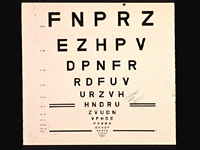Community Eye Health - 8761
Program Summary
Faculty: Faculty of Science
Contact: http://www.optom.unsw.edu.au
Campus: Sydney
Career: Postgraduate
Typical Duration: 1 Years
Typical UOC Per Semester: 24
Min UOC Per Semester: 6
Max UOC Per Semester: 24
Min UOC For Award: 48
Award(s):
Master of Community Eye Health
View program information for previous years
Program Description
Program Objectives and Graduate Attributes
- Developed an advanced understanding of the principles of community eye health and their applications;
- Developed the skills needed for innovative leadership in community eye health, including excellent analytical and communication skills;
- Developed an understanding of enquiry-based learning;
- Developed advanced critical thinking and problem solving skills;
- An awareness of international issues relating to community eye health.
Program Structure
- OPTM7001 Intro to Community Eye Health (6 UOC)
- OPTM7002 Community Eye Health Needs Ass (6 UOC)
- OPTM7003 Epid of Blinding Eye Diseases (6 UOC)
- OPTM7004 Advocacy & Edu in Com Eye Hth (6 UOC)
- OPTM7005 Eye Hlth Econ & Sustainability (6 UOC)
- OPTM7006 Eye Care Program Management (6 UOC)
- OPTM7007 Community Eye Health Project (12 UOC)
Academic Rules
Fees
Admission Requirements
Applicants with other relevant qualifications and experience not listed may apply for admission to this program as follows. This is in accordance with UNSW Policy and Procedure on Recognition of Prior Learning. Applicants will need to demonstrate that they have achieved the same knowledge and skills (learning outcomes) through their formal or informal learning as the qualifications listed for entry for this program. This may be evidenced by qualification certificates, records of assessment activities relating to course or program learning outcomes, examples of experience from the workplace, community, or other context which demonstrate relevant skills, knowledge or competencies, membership (or eligibility for membership) of professional organisations which require attainment of certain qualifications, or testimonials of skills, knowledge or competencies from workplace supervisors. Any relevant documentation should be attached to the application and will be considered by the Academic Coordinator for the Program.
Exit Provisions
Area(s) of Specialisation









